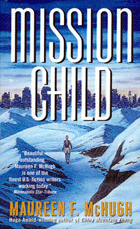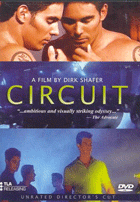| Duane Simolke, writer and humorist
offers up reviews of the book Mission Child by Maureen F. McHugh and of the
film (dvd format) of Dirk Shafter's "Circuit" Simolke is the author of several works of fiction and non-fiction, including his best-selling Acorn Stories (humor of a West-Texas variety, with true drama and surprise as only he can deliver) and Degranon (a science fiction vision of a world turned upside down by a miracle drug). |
 Mission Child Mission Child by Maureen F. McHugh 384 pages Publisher: Eos; (November 9, 1999) ASIN: 0380791226 (limited availability) A colonized world develops a unique identity and culture. Years later, one of its citizens develops a unique identity as well, adapting to her culture by taking on the identity of a man. Soon, she finds that her gender-blurring actually appeals to her in ways beyond what her situation demands of her. I love Mission Child as much as McHugh’s more popular novel China Mountain Zhang, which received the James Tiptree, Jr. Memorial Award, the Lambda Literary Award, and the Locus Award for Best First Novel. McHugh is a great writer who can involve readers in any scene, regardless of how much or how little action that scene contains. The language seems descriptive to an extreme, but she still manages to tie those descriptions into the thoughts and feelings of the characters. Before reading her work, I read reviews that included complaints about her supposedly not focusing on plot. Readers can find countless formulaic, plot-driven science fiction and fantasy novels, but they won’t find many original and evocative writers of McHugh’s caliber. McHugh’s other novels include Nekropolis and Half the Day Is Night. ===== Duane Simolke Author of the West Texas fiction collection The Acorn Stories and the science fiction adventure Degranon. Editor and co-author of The Acorn Gathering: Writers Uniting Against Cancer. http://DuaneSimolke.Com |
 "Circuit" "Circuit"
DVD, $19.99 Directed by Dirk Shafter Director Dirk Shafter offers a beautiful, glossy nightmare, with a dazzling soundtrack and wild camera angles. When John, played with perfect innocence and occasional disgust by Jonathan Wade-Drahos, suffers a gay-bashing at the hands of the very police force he serves on, he decides to move to L.A. and spend time with his gay cousin, Tad. Driving down the streets of L.A. and seeing openly gay men holding hands in public makes John smile. But then, when he arrives at Tad's house, he receives his first glimpses of a party scene that can destroy relationships and lives. Despite his attempts to the contrary, John soon becomes caught up in the drug culture of Circuits-huge weekend parties for gay men. Besides making an incredible amount of money for the organizers, these events often provide a setting for drug trafficking, often leading to unsafe sex. Considering that the events cater strictly to gay men, all of that leads to the spread of HIV. As one character ironically points out, the events sometimes promote themselves as fund-raisers for AIDS, or as places where condoms and safe-sex messages make their way to the gay male community. John has two tender, stabilizing relationships: one with his former girlfriend, and one with Tad's former boyfriend. Unfortunately, the less healthy relationships threaten to destroy him. While focusing on that plot, the movie also focuses on Tad's work as an amateur filmmaker who wants to make a documentary that exposes the dangers of the circuit scene. Even while filming interviews that show it at its worst, Tad still sees the scene's appeals, and the surprisingly positive sides of it. Will the two men survive their party world? I won't give that away, but I will say that the movie raises valid questions about a real scene with real allure and real dangers. The acting needs more emotion at places, but Dirk Shafer does a great job weaving his tale through the music and images that attract certain gay men to the circuit. One complaint about the DVD-a "play all" option always helps when offering a long list of deleted scenes or other features; hitting the remote every few seconds can get tiresome, even for people who usually commit channel surfing. Repeated viewings of this movie shouldn't get tiresome, though. Shafer offers a controversial depiction of a segment of the gay male community, one that will probably receive more recognition as we examine the impact of the circuit scene on a group that already lost way too many people to drugs and AIDS. |